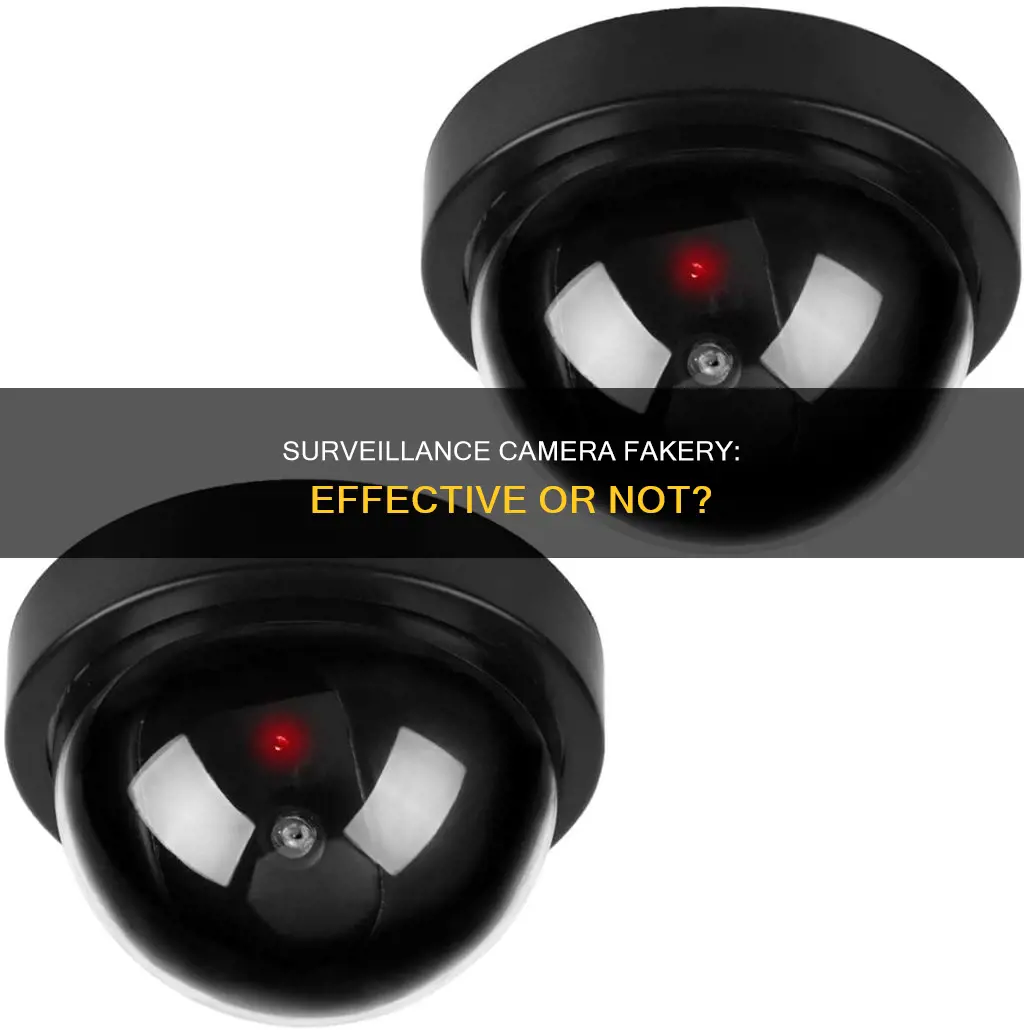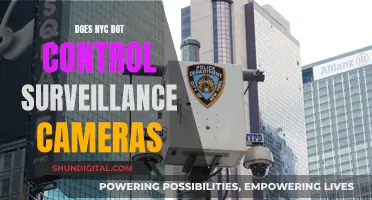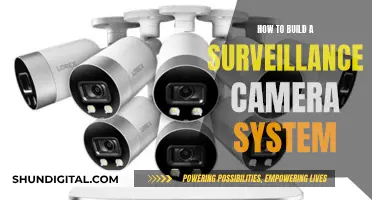
Fake security cameras are designed to mimic the appearance of real surveillance cameras. They are often cheap and easy to install, and can act as a deterrent to potential intruders. However, their effectiveness is limited compared to real security cameras, especially as experienced criminals can often identify dummy cameras. In the event of a break-in, fake security cameras cannot record footage or provide evidence, and may even result in legal issues for the owner if people felt safe due to their presence.
| Characteristics | Values |
|---|---|
| Effectiveness as a crime deterrent | Fake security cameras can be somewhat effective as a crime deterrent because they create an illusion of surveillance. However, they are not as effective as real security cameras, especially against intruders who can spot fakes. |
| Cost-effectiveness | Fake security cameras are usually cheaper than real ones, but there are also real security cameras available at a similar price point. |
| Ease of installation | Fake security cameras are easier to install than real ones as they do not require cabling for power or data transmission. |
| Legal issues | The use of fake security cameras can lead to legal issues if people feel safe because they believe the cameras are real and then become victims of a crime. |
| Evidence collection | Fake security cameras cannot record footage, which is crucial for identifying and prosecuting criminals. |
What You'll Learn

Fake security cameras are based on the theory of panopticism
The concept of panopticism was derived from the panopticon, a type of institutional building designed by philosopher Jeremy Bentham in the 18th century. The panopticon allowed a single observer to monitor prisoners without the inmates knowing whether or not they were being watched. This created a sense of uncertainty that motivated the prisoners to act as if they were always under observation and effectively compelled them to self-regulate their behaviour.
Similarly, fake security cameras aim to create the illusion of surveillance, acting as a deterrent to potential intruders. The effectiveness of this deterrence depends on the intruder's ability to spot a fake camera. While some studies have suggested that the sight of a security device may deter thieves, experienced criminals can often tell the difference between real and fake cameras, which diminishes the deterrence effect.
It is important to note that fake security cameras have limitations. They cannot record footage, provide evidence in the event of a crime, or offer remote monitoring and notifications. Therefore, while fake security cameras may have some positive influence on dissuading burglars, they are not as effective as real security cameras in providing comprehensive security and peace of mind.
Sony HDR-CX405: Exploring the Shooting Modes
You may want to see also

They are cheaper and easier to install
Dummy security cameras are significantly cheaper than real security cameras. They are also easier to install because they do not require cabling for power or video data transmission to storage devices and real-time interfaces. They do not require video data storage devices or plans because they do not capture any surveillance footage.
Dummy cameras are a good option for businesses operating on a tight budget as they are better than no security measures at all. They can also be used in conjunction with real security cameras to enhance the overall security of a property.
Dummy cameras are usually made from plastic, steel, or aluminium and can be designed to look like dome security cameras, C-Mount cameras, and pan-tilt zoom cameras. They are typically priced between £10 and £40.
Dummy cameras can be purchased from Amazon, Lowe's, and Walmart.
The Evolution of Minolta Cameras: A Global Journey
You may want to see also

They can't record footage or catch intruders
Fake surveillance cameras are designed to mimic the appearance of real cameras. They are often made from plastic, steel, or aluminium and can resemble various types of security cameras, such as Dome cameras, C-Mount cameras, and Pan Tilt Zoom cameras. One of their main goals is to act as a deterrent, creating the illusion of surveillance to discourage potential intruders.
However, one of the significant limitations of fake surveillance cameras is their inability to record footage or catch intruders. While they may give the impression of functioning cameras, they lack the actual capabilities of real surveillance equipment. This means that in the event of a break-in or theft, these dummy cameras offer no concrete evidence or recourse. They cannot capture footage, identify culprits, or provide real-time notifications and footage streams that could lead to arrests.
The absence of recording capabilities in fake surveillance cameras can have significant implications for security and accountability. In the unfortunate event of a crime, there is no footage to aid investigations, identify perpetrators, or support prosecution. Real security cameras, on the other hand, provide valuable evidence and play a crucial role in understanding the sequence of events before and after a crime, ultimately enhancing future security measures.
Additionally, experienced criminals or intruders may be able to spot fake surveillance cameras. The absence of subtle details and functionalities that real cameras possess can make them less effective as a deterrent against seasoned intruders. Therefore, while fake cameras may provide a basic level of deterrence, they cannot match the comprehensive security and peace of mind offered by authentic surveillance systems.
Traffic Camera Tickets: Enforceable in AZ?
You may want to see also

They can create a false sense of security
Dummy security cameras are designed to mimic the appearance of real surveillance cameras. They are often cheap and easy to install, and are built on the assumption that the appearance of security measures alone will deter crime. However, this assumption can create a false sense of security, which can have dangerous consequences.
The presence of visible security cameras can give staff, tenants, and visitors a sense of safety and security. When someone entering a property spots security cameras, they assume that the footage is being monitored or recorded. In residential properties, security cameras are often used as a selling point for prospective or current residents, creating an expectation of safety.
If a crime occurs, residents or visitors may expect that the incident was captured on recorded video footage that can be used to investigate the crime and identify the perpetrator. They may also expect that someone is monitoring the security cameras in real time, ready to intervene. Failure to meet these expectations can subject property owners and managers to liability.
In some cases, property owners and managers have been held liable for assaults or other crimes that occurred on their premises. For example, an employee who intentionally parked their car and left valuables within the company premises in full view of a security camera later found that their car and valuables had been stolen. When the employee asked to review the footage, the employer had nothing to provide because the camera was a dummy. The employer then had to battle a lawsuit.
Dummy cameras can also be easily identified by burglars and criminals, who are often much more knowledgeable than people think. A knowledgeable or experienced criminal can easily tell the difference between a dummy camera and a real one, for example, by spotting a blinking light, a single-wire connection, or arbitrary lens movement. When a burglar knows that a property has dummy cameras, it may become a target for crime.
School Bus Camera Tickets: Are They Legal?
You may want to see also

They can be a liability for business owners
Fake security cameras are designed to mimic the appearance of real surveillance cameras to deter criminals. While they are often cheap and easy to install, they cannot secure property or protect people. In the event of a crime, there will be no recorded footage to assist in identifying the perpetrators.
The presence of visible security cameras can give staff, tenants, and visitors a false sense of security. If a crime occurs, the victim may expect that the incident was captured on recorded video footage that can be used to investigate the crime and identify the perpetrator. Failure to have working security cameras installed when people are under the impression that there is a reasonable level of safety in the area can subject property owners and managers to liability.
Business owners may also be held liable for assaults or other crimes that occur on their premises if they have installed fake security cameras. In such cases, the property owner or manager may be sued for providing a "false sense of security". For example, an employee who parks their car and leaves valuables within the company premises in full view of a security camera may return to find their car and valuables stolen. When they ask to review the footage, the employer has nothing to provide since it's a fake camera. The employer may then have to battle a lawsuit.
Additionally, if a business advertises security cameras or systems as an amenity, there is a certain expectation of safety. If a crime occurs, the resident may expect that someone is monitoring the security cameras in real time or that the incident was captured on recorded video footage. Failure to meet these expectations can result in liability for the business owner.
In summary, while fake security cameras may seem like a cost-effective option, they can ultimately cost your business much more in liability lawsuits and a damaged reputation. Real security cameras, on the other hand, can help prevent crime, protect people, and provide valuable evidence in the event of an incident.
The Last Polaroid 600 Camera: When Did It End?
You may want to see also
Frequently asked questions
Fake surveillance cameras can be somewhat effective as they create the illusion of surveillance and act as a visual deterrent to break-ins. However, their effectiveness is limited compared to real security cameras, especially against intruders who can spot fakes.
Real security cameras offer actual footage capabilities and evidence collection. They can also provide features like remote monitoring access, motion detection, night vision surveillance, and remote access to live streams and recorded footage.
Fake security cameras cannot record footage, which is crucial for identifying and prosecuting thieves. They also cannot provide real-time notifications and footage streams that can result in arrests. Additionally, they may create a false sense of security for employees, tenants, and visitors, who assume that the property is being monitored or that footage is being recorded.
Yes, there have been cases where business owners have been sued for using fake security cameras. They were accused of providing a "false sense of security". If people outside your home or business feel safe because they believe the dummy cameras are real, they may have grounds for legal recourse in the event of a crime.







